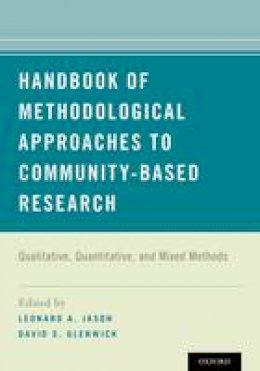
Stock image for illustration purposes only - book cover, edition or condition may vary.
Handbook of Methodological Approaches to Community-Based Research: Qualitative, Quantitative, and Mixed Methods
Leonard A. Jason (Ed.)
€ 142.17
FREE Delivery in Ireland
Description for Handbook of Methodological Approaches to Community-Based Research: Qualitative, Quantitative, and Mixed Methods
Paperback. The Handbook of Methodological Approaches to Community-Based Research is intended to aid the community-oriented researcher in learning about and applying cutting-edge quantitative, qualitative, and mixed methods approaches. Editor(s): Jason, Leonard A., PhD; Glenwick, David S. Num Pages: 368 pages. BIC Classification: JHBC; JKSN; JMH; JNC. Category: (P) Professional & Vocational; (U) Tertiary Education (US: College). Dimension: 254 x 178. .
The field of community psychology has focused on individuals' and groups' behavior in interaction with their social contexts, with an emphasis on prevention, early intervention, wellness promotion, and competency development. Over the past few decades, however, community-based applications of the newest research methodologies have not kept pace with the development of theory and methodology with regard to multilevel data collection and analysis. The Handbook of Methodological Approaches to Community-Based Research is intended to aid the community-oriented researcher in learning about and applying cutting-edge quantitative, qualitative, and mixed methods approaches. The Handbook presents a number of ... Read more
The field of community psychology has focused on individuals' and groups' behavior in interaction with their social contexts, with an emphasis on prevention, early intervention, wellness promotion, and competency development. Over the past few decades, however, community-based applications of the newest research methodologies have not kept pace with the development of theory and methodology with regard to multilevel data collection and analysis. The Handbook of Methodological Approaches to Community-Based Research is intended to aid the community-oriented researcher in learning about and applying cutting-edge quantitative, qualitative, and mixed methods approaches. The Handbook presents a number of ... Read more
Product Details
Publisher
Oxford University Press Inc United States
Number of pages
368
Format
Paperback
Publication date
2016
Condition
New
Weight
663g
Number of Pages
408
Place of Publication
New York, United States
ISBN
9780190243654
SKU
V9780190243654
Shipping Time
Usually ships in 15 to 20 working days
Ref
99-8
About Leonard A. Jason (Ed.)
Dr. Leonard A. Jason is a professor of psychology at DePaul University, where he is the director of the Center for Community Research. He has published over 650 articles and 75 book chapters on such social and health topics as the prevention of, and recovery from, substance abuse; preventive school-based interventions; multimedia interventions; the diagnosis and treatment of Myalgic ... Read more
Reviews for Handbook of Methodological Approaches to Community-Based Research: Qualitative, Quantitative, and Mixed Methods
The editors and authors have done a tremendous service to the field by bringing together the full range of community-based research methods in a single, comprehensive volume. The result is a valuable resource for researchers, practitioners, students, and community organizations alike.
Keith Humphreys, PhD, Professor of Psychiatry, Stanford University There is no genre ... Read more
Keith Humphreys, PhD, Professor of Psychiatry, Stanford University There is no genre ... Read more
